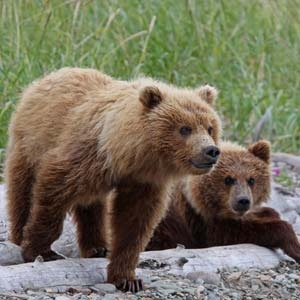
But these bears aren't dying. The industry is.
Though their bile has been used as medicine in Asia for thousands of years, cheaper foreign sources, growing scepticism over bear bile's medicinal value and worries about international condemnation have led to a huge drop in South Korean demand. Kim KwangSoo, the owner of this farm in Dangjin, about 120 kilometres (about 75 miles) south of Seoul, said he hasn't had a bear bile customer in five years.
Farmers want a deal
That, however, doesn't ensure the animals a peaceful future. The government is offering farmers money and incentives to sterilise or slaughter their bears, but the farmers are demanding much more.
Kim, secretary general of a bear farmers' association, said farmers are considering suing or even more drastic measures such as harming their bears if they can't reach a deal. He said farmers will raise the issue of greater government compensation during a meeting with government officials and civilian experts.
To highlight their grievances, farmers in November brought caged bears to downtown Seoul and near a government complex in the city of Sejong. Kim said farmers are now considering hauling bears, 20 per cage, to the Sejong government complex in the hope that the fighting, cramped animals will bring them attention.
"People talk about animal welfare... but bear farmers aren't getting any welfare," said Yun Youngdeok, who runs a bear farm near Seoul. "We feel like we are dying earlier (than our bears)."
Bear bile no longer popular
South Korea is one of the few countries that allow the farming of bears to extract bile for traditional medicine. About 50 farms are raising about 1 000 bears, mostly Asiatic black bears, also known as moon bears. They are the descendants of bears imported from Malaysia and other Southeast Asian countries when bear farming began here in the early 1980s.
Kim said South Koreans were once willing to pay between 20 million to 30 million won (about R20, 000 to R30, 000) to have a bear slaughtered for its bile. But farmers ran into trouble about a decade ago, when bear bile from China and Vietnam became more readily available.
Now the farmers have an even bigger problem: Bear bile just isn't popular. South Korea imported only 2.8 kilograms of dried forms of bear gall bladders between 2008 and 2012, according to the Ministry of Food and Drug Safety. In 2011, about 94% of South Koreans surveyed by the private Hangil Research Centre said they had never bought bear bile and had no intention of doing so. The telephone survey of 1 000 people had a margin of sampling error of plus or minus 3.1 percentage points.
The bear farmers' association says most of its members haven't sold any bile in five or six years. Meanwhile, huge debts from feeding and maintaining the bears are mounting. Kim, who has about 270 bears at his farm, said their upkeep costs him about 300 million won (R300, 000) annually.
Read more: Africa's only polar bear mourns partner's death(Picture: Bears from Shutterstock)




 Publications
Publications
 Partners
Partners














